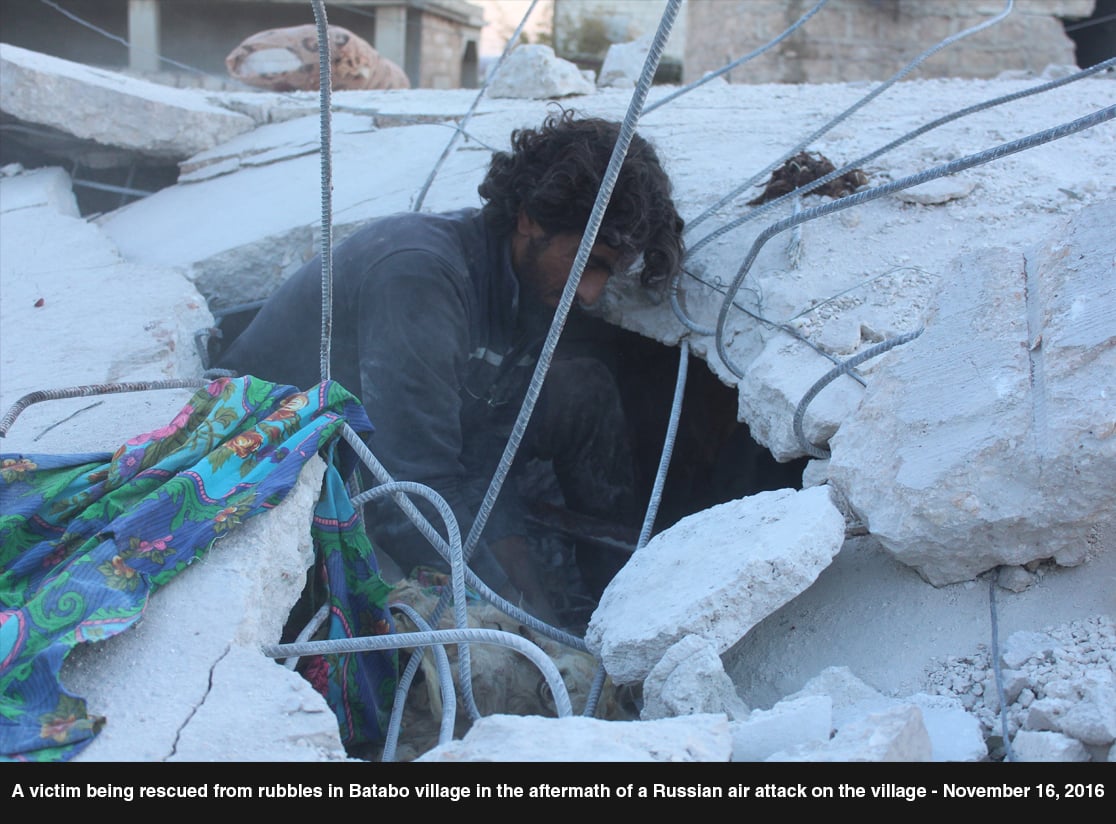Killing 22 Civilians including Four Children and Seven Women in a Massacre in Batabo Village

SNHR has released a report entitled: “Russian Airstrikes Have Targeted Relief Warehouses in Western Aleppo Suburbs” in which it documented the killing of 22 civilians in Batabo village, western suburbs of Aleppo governorate, on November 16, 2016.
The report draws upon accounts from city residents, eyewitnesses, and survivors where the report contains three accounts. The report adds that SNHR explained the purpose of these interviews for the witnesses who gave permission to use the information they provided without offering or giving them any incentives. Also, SNHR has tried to spare the witnesses the agony of remembering the violations as much as possible, and we gave insurances to conceal the identity of any witnesses who preferred to use an alias.
In addition, the report contains verified pictures and videos that show the attack sites and the huge destruction in the aftermath of the bombing.
According to the report, the targeted areas were civilian areas where no military centers or weapon warehouses for armed opposition factions or extremist Islamic groups were found before or during the attack. Also, Russian forces didn’t alert the civilians prior to the attack as the international humanitarian law requires.
The report says that on Wednesday, November 16, 2016, around 14:30, fixed-wing warplanes we believe were Russian fired four missiles, where three missiles targeted warehouses for Ataa Relief Association in the northwest neighborhood of Batabo village while the fourth missile targeted a residential building about 300 meters to the north of the first attack’s site. The bombardment, according to the report, has resulted in the killing of 22 civilians, including four children and seven women (adult female). Additionally, the residential buildings and Ataa Relief Association’s warehouses have suffered severe destruction.
The report stresses that the Russian regime has, beyond any doubt, violated Security Council Resolutions 2139 and 2254 which both state that indiscriminate attacks must be halted. Also, The Russian regime has violated Article 8 of Rome Statute through the act of willful killing which constitutes war crimes.
The report adds that bombardment mentioned in this report has targeted defenseless civilians. Therefore, the Syrian-Russian alliance forces have violated the rules of the international human rights law which guarantee the right to life. Additionally, these violations were perpetrated in a non-international armed conflict which amount to a war crime where all elements were fulfilled.
The report calls on the Security Council to take additional steps as Resolution 2139 has been adopted and no pledges to cease the indiscriminate bombardment operations have been made. All the parties to the conflict should respect these stops and adhere to the rules of the international humanitarian law.
Moreover, the report calls for the referral of the Syrian case to International Criminal Court and all those who are responsible must be held accountable, and to implement the Responsibility to Protect norm in order to protect the lives, culture, and history of the Syrian people from being destroyed, looted, and ruined. Also, sanctions should be expanded to include the Syrian, Russian, and Iranian regimes who are directly involved in committing crimes against humanity and war crimes against the Syrian people.
The report emphasizes that the International, Impartial and Independent Mechanism that was established in accordance with General Assembly Resolution 71/248, adopted on December 21, 2016, should be supported, establish local tribunals that enjoy a universal jurisdiction, and address the war crimes that were perpetrated in Syria.
The report says that the OHCHR should submit a report to the Human Rights Council and other organs of the United Nations on this massacre in particular, and the massacres that preceded it, as they are a glaring point in a string of daily, sporadic massacres of a smaller scale.
Lastly, the report calls for the implementation of the norm of Responsibility to Protect after all political channels through the Arab League’s agreement and then Mr. Kofi Annan’s plan have been drought out. Therefore, steps should be taken under Chapter VII of the Charter of the United Nations, and the Responsibility to Protect norm, which was adopted by the United Nations General Assembly, should be implemented. The Security Council is still hindering the protection of civilians in Syria.


